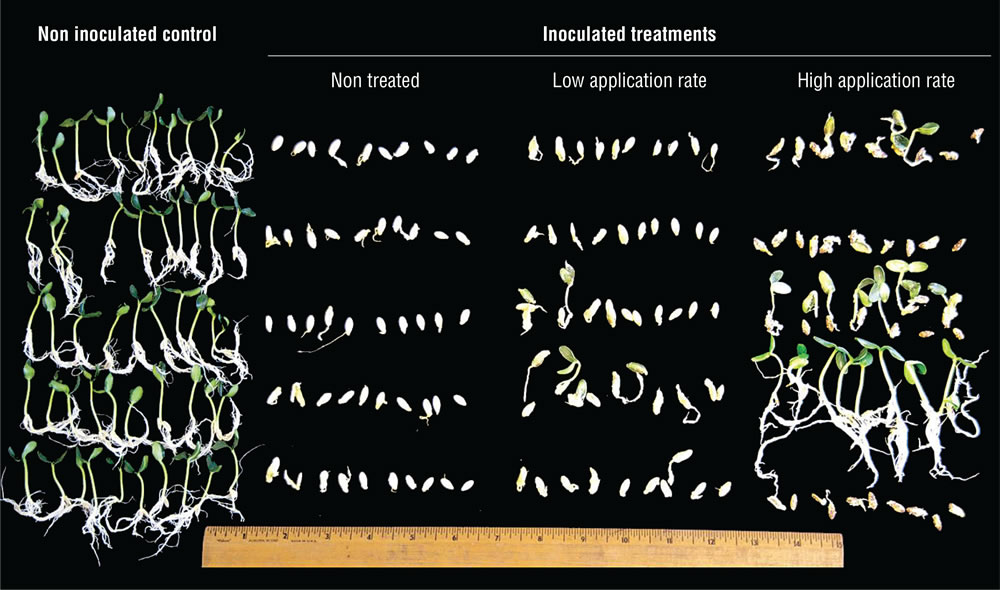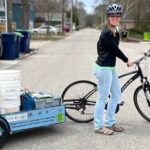Nora Goldstein
BioCycle January 2016
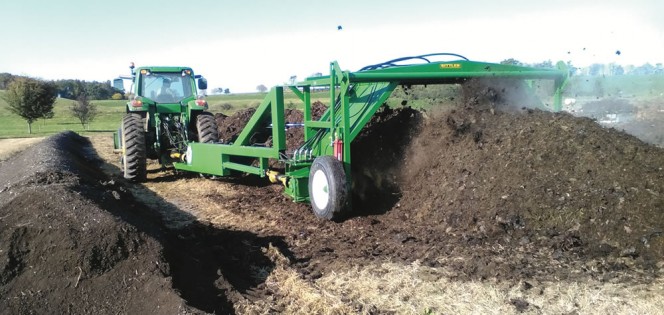
The Rodale Institute’s composting site accepts leaves and grass from municipalities. It had been taking commercial food scraps but discontinued the practice due to contamination in the material. Photo courtesy of the Rodale Institute
Compost Science — the original name of BioCycle — was started in 1960 at Rodale Press by its editor, Jerome Olds (aka Jerome “Jerry” Goldstein, who founded The JG Press, Inc. in 1978). At that time, Jerry was an editor of the Rodale publication then called Organic Gardening & Farming. In the Premier Issue of Compost Science in Spring 1960, Jerry wrote the following in his Editorial:
“…Organic Gardening and Farming,” started in 1942, has as its major editorial theme, the return of humus to the soil in order to build and maintain fertility. This editorial theme has kept us in close contact with progress in the composting field during the past 15 years. Now we firmly believe that sufficient progress has been made to establish a regular method for getting this information into the hands of engineers, municipal officials and industrial executives who can use it.”
The integral relationship between composting and compost utilization in organic gardening and farming prompted BioCycle to reach out to the new Executive Director of the Rodale Institute, Jeff Moyer, who has served as the Institute’s Farm Manager for many years. We arranged an interview with Moyer and Rick Carr, who conducts compost research at the Institute, to discuss this relationship — 58 years after BioCycle was founded as Compost Science.
BIOCYCLE: Connections between composting and compost utilization and organic and sustainable agriculture have always been front and center for BioCycle. What are your views, 58 years since Compost Science began, as to the importance of those connections?
MOYER: Composting and compost have never left our mission at Rodale Institute. It is completely intrinsic to what we advocate. Compost is part of the “soil health package,” increasing soil organic matter, sequestering carbon and holding water. In addition to soil health, compost is starting to be recognized as a tool to address the negative impacts on agriculture caused by a changing climate.
BIOCYCLE: BioCycle published several articles in 2015 that reported on the results of compost use trials in agriculture. One of the articles, “Compost Use Trials On Ontario Farms” (June, 2015), noted the need to apply commercial nitrogen fertilizer on some types of crops because compost “may not provide enough nutrients on its own” and the nutrients “may not be released consistently and predictably.” Have you seen this as a hindrance to compost use in organic agriculture?
MOYER: This ties directly back to compost being part of the package. If a farmer tries to get all nutrients from compost, the soil health package gets out of balance. We talk about compost more as a tool to feed the microbes in the soil. The nitrogen comes from cover crops, e.g., legumes. When organic farmers have well-balanced crop rotations with a window to get the cover crop established, the need for fertility diminishes tremendously. They end up with a balanced package for crop production. Cover crops alone are not the solution. Compost alone is not the solution. Fertilizer alone is not the solution. When all three are in the package, organic producers end up with a dynamic system and regenerate soil health and productivity.
BIOCYCLE: What composting and compost utilization research is Rodale Institute involved in at this time?’
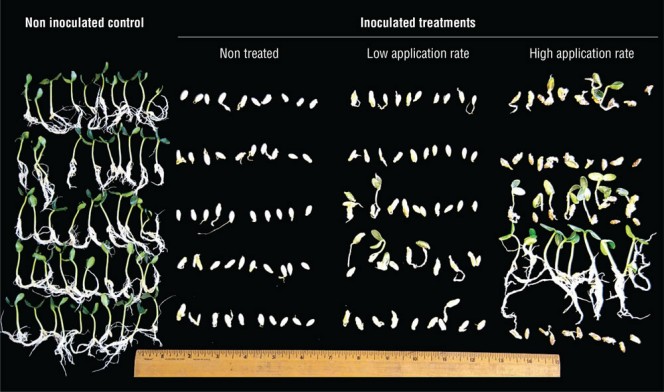
Figure 1. Microbial seed treatment using freeze-dried compost on cucumber shows a dose response in the rate of application when attempting to suppress Pythium damping-off. Photo by Mary Ann Karp
CARR: Our current research is evaluating a novel approach to deploying the microbial content of compost onto the seed surface for protection against common, soil-borne plant pathogens (Figure 1). (See Composting Roundup, September 2015.) In the past, we have conducted nutrient management studies with compost as a component of the management plan. Our flagship experiment, the Farming Systems Trial, examines three different agricultural systems, each featuring diverse management practices: a composted manure-based system, a legume-based organic system, and a synthetic input-based conventional (chemical) system. The most difficult obstacles to overcome when investigating the benefits of compost are variability and unpredictability. Compost is quite variable from one product to the next, which can make it challenging to synthesize results among different studies.
MOYER: Another factor affecting outcomes is the great diversity across the country and globally with regard to climate and soil types. Farmers want to see something work on their soil type and under their conditions. One of my first initiatives as the new Executive Director is to work on a plan to develop Regional Resource Centers that function as ‘mini’ Rodale Institutes that are tightly tethered to our home base near Kutztown, Pennsylvania. We are going to start small — likely set up in three locations with a three person staff at each place. We need these hubs of support if organic agriculture is going to grow.
Composting Lessons Learned
BIOCYCLE: The Rodale Institute has its own composting operation, and receives organic waste streams from off the farm. What materials are you composting, and what are the major lessons you have learned?
CARR: We accept leaves from up to six different municipalities in the area. Grass comes in from two different communities and we receive wood chips from time to time. The rest of the feedstocks composted are from our own farming operations. There was a time when the Institute took food scraps from restaurants and grocery stores but we discontinued that because the material was too contaminated.
MOYER: As far as the major lessons we’ve learned from having our own composting operation, a key one when taking off-farm feedstocks is to not become a recipient of garbage! From the standpoint of an organic farming operation having its own composting site, we are able to customize our compost for a variety of applications, from field crops to vegetables to ornamentals. However, even low levels of contamination in the compost can raise issues: it becomes unsightly very quickly and can pose a hazard to grazing animals.
BIOCYCLE: The Food and Drug Administration recently finalized the Food Safety Modernization Act that establishes, for the first time, science-based minimum standards for the safe growing, harvesting, packing, and holding of fruits and vegetables grown for human consumption. Biological soil amendments are included in the rule, including use of composted and raw manure. How do these new rules affect organic growers, and could they lead to increased use of compost due to the waiting period established for raw manure application?
MOYER: It is the goal of all growers, conventional and organic, to supply the safest and healthiest product to the marketplace. In that context, the new rules impact all of us about the same. There may be more issues relevant to the size of a particular operation since any expansion of a tracking system and paperwork could add to the overall time commitment for a grower. Larger operations may be able to absorb that time commitment more efficiently. As to the use of raw manure versus compost, the national organic regulations already account for that difference and organic farmers have always been encouraged to produce and use compost rather than raw manure, especially for vegetable production.
Regional Initiatives
BIOCYCLE: Rodale Institute is very active locally (the Lehigh Valley) in bringing healthy food to people, and supporting community gardens and urban farms. What have been your major accomplishments with these endeavors?
MOYER: Our biggest accomplishment regionally is a farm project we are doing with St. Luke’s Hospital, one of the Lehigh Valley’s health care providers with six different campuses in the region. We established a farm on 5 acres of land at St. Luke’s Anderson campus and are now working on farming another 5-acre plot at that site. Produce is taken right into the Anderson campus hospital for patients and staff, as well as distributed to the other 5 hospitals. A total of 45,000 lbs of produce were grown in each of the 2014 and 2015 seasons.
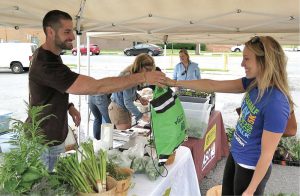
“Organic Allentown” creates opportunities for people who want to farm by assisting with access to underutilized urban land and establishing farmers markets (above) to sell the produce. Photo courtesy of the Rodale Institute
Another program is called Organic Allentown, where we are working with people who want to become farmers. There are opportunities within the city limits for them to farm, and create farmers markets to sell the produce. The Institute has been working with city officials to identify five different areas that are underutilized and will be the most appropriate and effective to develop.
BIOCYCLE: Several years ago, we saw an announcement that Rodale Institute, in collaboration with Delaware Valley University (DelVal), established a training program targeted at military veterans. The idea was to teach veterans organic farming skills — both in the classroom at DelVal and on the farm at the Rodale Institute — and then provide placement options for graduating veterans in the agricultural workforce. How many veterans have been through the program to date? And can you provide a quick case study?
MOYER: Over the past two years we have had four veterans complete the program and we currently have seven enrolled for the spring semester. This 12-month program is open to all students at DelVal and consists of two semesters at DelVal and a summer semester with a farm practicum at the Rodale Institute. Several students are continuing their education at DelVal while other students are excited to start up organic farms when they return home after completing the program.


